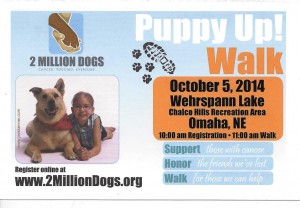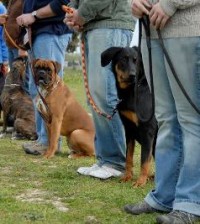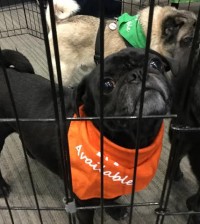- Do you subscribe to Dharma Dog Training’s Newsletter? You should.
- A Unique Campaign from The Humane Society of the United States
- Rabid bats in Omaha- Stay safe, prepared with these tips
- Springtime Activities in Omaha
- Mill Dog Monthly from Bailing Out Benji
- World Spay Day, Legislative Alert in Nebraska
- Attend the Nebraska Rescue Council’s monthly meeting this Saturday
- Five Hard-to-Ignore Reasons to Adopt!
- Paws in Pink to Benefit Breast Cancer Foundation
- VCA, Inc. Acquires MidWest Vet Specialists from Kansas State University
Preventative Care for Canine Cancer
To help spread awareness and educate dog owners with any information we can, we’re passing on some tips from i Love Dogs, a canine advocacy group. It has been said that if your pup lives long enough, the odds that they will develop some sort of cancer is very near 100 percent. Outside of accidents, other diseases like congestive heart failure or heartworm, cancer is the number one killer of dogs.
Preventative measures and early diagnoses are the best way to beat the odds cancer presents us, so please read these helpful tips i Love Dogs provided us:
Although there is no single cause of canine cancer, we know that some environmental factors do promote cancer.
Long-term lifestyle choices can help shield your dog from cancer: keeping your dog fit, providing a healthy diet and limiting exposure to secondhand smoke, pesticides and herbicides.
But here are simple steps you can take now to lower your dog’s risk of cancer:
- Spay/neuter your dog
Mammary cancer is extremely rare in female dogs that were spayed before their first heat. Testicular cancer is most common in older unneutered male dogs, and can usually be prevented by sterilizing your dog.
- Bring your dog for regular vet check-ups
With regular check-ups, your vet can establish your dog’s baseline data for weight, blood work, unique physical characteristics and abnormalities. If your dog’s check-up deviates from his baseline, your vet will know that additional screening may be needed.
- Remove environmental toxins
Exposure to toxins is one of the potential causes of canine cancer. They can break down healthy cells and compromise your dog’s immune system, reducing his ability to fight off the damage. Do an audit of your home and remove any potential toxins. Use only glass or stainless steel food and water bowls.
- Provide high-quality food
Patrick Mahaney, VMD, CVA suggests supporting your dog’s immune system by providing freshly prepared nutrients in daily meals: “Focus on a diet based in whole foods: cooked whole protein sources, some whole grains and densely colored and fiber-rich fruits and vegetables.”
- Supplements
Natural supplements are recommended by holistic doctors as a method of preventing canine cancer. Consult your veterinarian on possible supplements that can help ward off cancer or make life a bit easier for them if cancer announces its presence.
i Love Dogs (which can be found at iLoveDogs.com), has also provided us with some helpful information about when, god forbid, your pup gets the diagnosis of cancer. Read below to find some tips and develop an action plan.
If your dog does receive a cancer diagnosis, what do you do?
First of all, ask your veterinarian for a referral to a veterinary oncologist. For a holistic approach, seek a veterinary onologist from the American Holistic Veterinary Medical Association’s website.
Depending on the type and stage of cancer, your vet or oncologist may recommend:
- Surgery
Surgery may be the only way to remove tumors that cannot be shrunk with chemotherapy or radiation. Afterward, chemotherapy and/or radiation treatment may be recommended to ensure the cancer cells have not spread to any surrounding bone or tissue.
- Chemotherapy
Chemotherapy uses drugs to fight and kill the cancer cells in your dog’s body. These drugs are usually given intravenously, but some drugs may be available in pill form. Supplements containing reishi mushroom and decaffeinated green tea can be used to counteract the side effects of chemo.
- Radiation
Recommended for extremely localized cancers, radiation therapy directs high-energy photons or electrons at the site of the cancer in an attempt to eradicate all tumor cells. Radiation causes side effects, so consider providing your dog with a reishi supplement to help keep him comfortable.
- Supplements/Nutraceuticals
Studies have shown that supplementing dogs with natural anti-cancer substances like reishi mushroom and decaffeinated green tea can help reduce the size and appearance of tumors, as well as prevent the growth of secondary tumors. Both reishi and green tea help strengthen the immune system and promote cell health, significantly strengthening dogs’ defenses against cancers. Reishi can also counteract the side effects of other cancer treatments, such as chemotherapy and radiation.
Thanks to i Love Dogs for providing this comprehensive and interesting information.
Our best advice would be to get yearly check-ups, like the ones you get for yourself (hopefully), live a healthy and active life and develop a plan for when your dog reaches that certain age where things like this are likely to pop up. Prepare by being vigilant with exercise and diet; also prepare for when the time comes to make decisions as to the well-being and quality of life your dog deserves.
Also, as an community advocacy effort, attend the Puppy Up! Walk in Omaha this fall to combat cancer!
October 5, 2014- Puppy Up! Walk comes to Chalco Hills Recreation Area to combat cancer, raise funds for 2 Million Dogs
Coordinated by Paws and Whiskers Photography and Paws to Angels Pet Loss Center. Local dog lovers, in partnership with 2 Million Dogs, a national nonprofit organization that funds comparative oncology research benefiting both pets and people, will be holding the Puppy Up! Omaha Walk to raise funds and awareness of the common links between canine and human cancers.
Chalco Hills Recreation Area
Registration begins at 10:00am
Walk begins at 11:00am
Preregistration by October 2 is $20 per person; free for kids 14 and under; kids must be accompanied by an adult. Registration the day of the walk is $30 per person. Participants may bring up to two dogs each. All dogs must be 4 months or older, up to date on vaccinations and must be on a 6-foot or shorter leash at all times (no retractable leashes). Water for dogs and waste bags will be provided.
For more on the Puppy Up! Walk or to register, please visit www.2Milliondogs.org and search for the local Omaha walk. You may also contact Paws and Whiskers Photography (402-909-1382) or Paws to Angels Pet Loss Center (402) 507-0585 for additional information.
Related Posts
Latest News
-
3 Tips for Pet Owners on Training Rescue Dogs
Owning a rescue dog can take some work compared to...
- Posted 1 week ago
- 0
-
Choosing the Right Pet for Your Lifestyle
Are you thinking about getting a pet but unsure what...
- Posted 3 weeks ago
- 0
-
How to Make Your Rescue Pet as Comfortable as Possible
Did you bring home a new pet from a shelter...
- Posted 2 months ago
- 0
-
How Having A Pet Can Change Your Life
Having a pet can open your heart in ways that...
- Posted 7 months ago
- 0
-
How To Improve The Life Of Your Senior Pet
Do you have an elderly fur baby and want to...
- Posted 7 months ago
- 0
-
Springtime Activities To Enjoy With Your Furry Friends
Are you preparing for warmer weather and want some ideas...
- Posted 8 months ago
- 0
-
Pros And Cons Of Microchipping Your Pets
Have you considered whether your pets should be microchipped and...
- Posted 9 months ago
- 0






















You must be logged in to post a comment Login